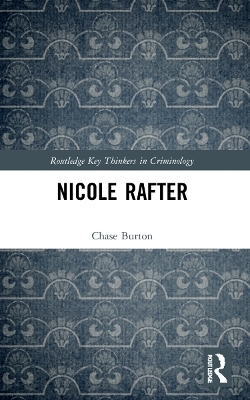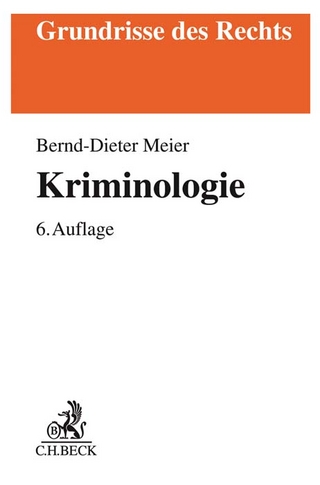
Nicole Rafter
Seiten
2023
Routledge (Verlag)
978-0-367-54740-0 (ISBN)
Routledge (Verlag)
978-0-367-54740-0 (ISBN)
This book is a critical summary and exegesis of the work of Nicole Rafter. It introduces Rafter’s key works and assesses her contributions to the fields of feminist criminology, cultural criminology, and historical criminology, and explores her theorization of criminology’s identity, scientific status, and possible futures.
This book is a critical summary and exegesis of the work of Nicole Rafter, who was a leading scholar of the history of biological theories of crime causation as well as a profound theorist of the role of history within criminology. It introduces Rafter’s key works and assesses her contributions to the fields of feminist criminology, cultural criminology, visual criminology and historical criminology. It also explores her theorization of criminology’s identity, scientific status, and possible futures.
While many books on criminological theory explain and historically contextualize theory, they do not interrogate the production of theory or the epistemological assumptions behind it. Drawing on the world of Nicole Rafter, this book offers an accessible handbook to her extensive historical studies and to how her work demonstrated the importance of historical theory to criminological knowledge. Furthermore, the author brings Rafter’s historical research to life and shows how it speaks to contemporary issues in criminology and punishment.
Written in a clear and direct style, this book will appeal to students and scholars of criminological theory, intellectual history, sociology, comparative criminology, and feminist criminology.
This book is a critical summary and exegesis of the work of Nicole Rafter, who was a leading scholar of the history of biological theories of crime causation as well as a profound theorist of the role of history within criminology. It introduces Rafter’s key works and assesses her contributions to the fields of feminist criminology, cultural criminology, visual criminology and historical criminology. It also explores her theorization of criminology’s identity, scientific status, and possible futures.
While many books on criminological theory explain and historically contextualize theory, they do not interrogate the production of theory or the epistemological assumptions behind it. Drawing on the world of Nicole Rafter, this book offers an accessible handbook to her extensive historical studies and to how her work demonstrated the importance of historical theory to criminological knowledge. Furthermore, the author brings Rafter’s historical research to life and shows how it speaks to contemporary issues in criminology and punishment.
Written in a clear and direct style, this book will appeal to students and scholars of criminological theory, intellectual history, sociology, comparative criminology, and feminist criminology.
Chase Burton is Assistant Professor of Law and Society at Leiden University. He received his Ph.D. and JD from the University of California, Berkeley. His work has been published in journals such as Law and Social Inquiry and The British Journal of Criminology.
1.An Introduction to Nicole Rafter 2.Prison History and Feminist Criminology 3.Intelligence, Biology, and Crime 4.Crime Films and Criminology 5.The End of Criminology? 6.Criminology and Genocide 7.Four Reflections
| Erscheinungsdatum | 28.09.2023 |
|---|---|
| Reihe/Serie | Routledge Key Thinkers in Criminology |
| Verlagsort | London |
| Sprache | englisch |
| Maße | 138 x 216 mm |
| Gewicht | 453 g |
| Themenwelt | Recht / Steuern ► Allgemeines / Lexika |
| Recht / Steuern ► EU / Internationales Recht | |
| Recht / Steuern ► Strafrecht ► Kriminologie | |
| Sozialwissenschaften ► Soziologie ► Gender Studies | |
| ISBN-10 | 0-367-54740-6 / 0367547406 |
| ISBN-13 | 978-0-367-54740-0 / 9780367547400 |
| Zustand | Neuware |
| Haben Sie eine Frage zum Produkt? |
Mehr entdecken
aus dem Bereich
aus dem Bereich


